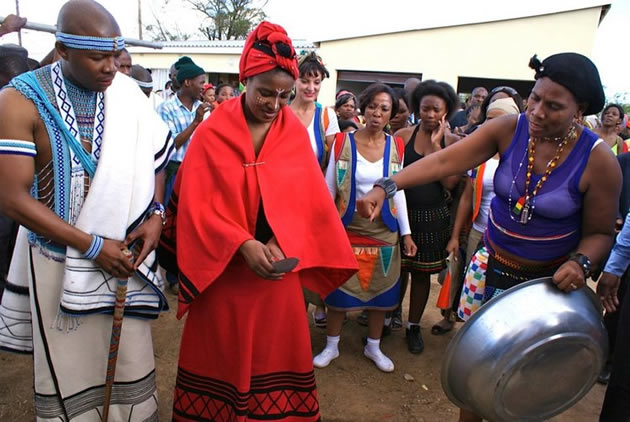It’s possible for a human being to earn the dog title

As Africans we don’t believe in individualism, even when a couple marry, they do so for both families
Ignatius Mabasa Shelling The Nuts
There are ties that bind us, that make us who we are as Africans. We share our joy with neighbours and friends when a child is born. People may not come bearing gifts in their hands, but their presence and words are what matters most. Some will sing, ululate, dance, joke and pray to express their happiness.
The same thing will happen when there is a marriage. Relatives, friends and neighbours will come pouring in, not only to witness the marriage or to see the new wife and her party, but they are the people who make the events colourful, spicy and memorable. This is also why our greetings sound odd when we say, “Tiripo kana makasimbawo, or tinofara kana muchifarawo.”
What it means is, if you are not well, or if something is troubling you, then I cannot claim to be well or okay because that which affects you also affects me, because I am a part of you. So, you find that even when one marries, they have married for the whole family, not to say they will share the wife intimately, but that the wife has not come for her husband only, but has come to become a part of the family – to become maiguru, muroora, muzukuru and amai and so forth.
The same applies to the husband; he gets a lot of new relations from his wife’s side – he is a son-in-law, an uncle and so forth.
Even when a person dies, funerals are not just for the bereaved family like in western countries. Among my people, the whole community comes together to commiserate and support the family. The men will chop and cart firewood. Others will dig the grave and share stories, tobacco and beer. The women on the other hand will bring contributions of maize-meal, they will cook, draw water, do the dishes and sing to help console and provide entertainment. Generally, this togetherness makes our funerals, especially in the rural areas, amazing and so different from the convenience of a funeral conducted by funeral parlours in the city where most of the work that brings people together is paid for.
I lost a niece last week and had to travel to Chiweshe for her burial. It was encouraging to witness the communal spirit of togetherness at work. Yet, there something happened during the funeral that made me realise that funerals are not just a grieving process that ends with burial. Our funerals are also an opportunity to review our relations with each other. When families are gathered, it is also a time to reflect on several things that make us a people – hunhu. My nephew’s funeral was tense because there were cultural and decorum issues that needed to be discussed.
Speaking at that funeral in Chiweshe, an elderly man with a shiny bald patch on his head said, “Munhu haasi wemunhu mumwe chete.” His statement captured deep African philosophy and is not easy to translate because it means so many things. It can mean, “A person does not belong to himself, he has to share himself with others,” or “A person is part of other people, or has a part to play in other people’s lives,” or “We raise children not for our own benefit, but for the benefit of others.” This explains why when the Shona people congratulate the parents of a newborn baby by saying, “Makorokoto,” the response is a standard and almost universally accepted phrase, “Ndeedu tese.” By saying “Ndeedu tese,” we will be saying, you the speaker of the congratulatory message and me the mother or father of the baby share the joy of the birth because the baby belongs to all of us. It is our family, our village and country that the new baby, the person belongs to because nyika vanhu.
There are times when people feel that they have been violated because the other part has failed or is not showing hunhu. Hunhu is in the way people speak, the way they behave, think, dress and relate with others. Culture expects certain behaviour from individuals and groups of people, and these days, that expected behaviour is often found wanting. Such situations go on to create or become a source of conflict.
What made the old man at the funeral in Chiweshe to say, “Munhu haasi wemunhu mumwe chete” was because my niece died leaving behind five children, two sons-in-law and four grandchildren. Her husband who died some 13 years ago had not paid lobola to my niece’s family. So, when my niece died, her husband’s family was expected to pay the lobola that had not been paid by their son. There was a school of thought that said, if this guy died without paying his lobola, then his in-laws missed their opportunity and they should let sleeping dogs lie.
But, what angered my niece’s father and his kin was that, after the death of their son-in-law, the family had the cheek to marry off the man’s two daughters, and collect lobola money and cows when they knew that they had not paid lobola for the mother of these two girls. This is why the old man who said, “Munhu haasi wemunhu mumwe chete.” He was challenging the family for failing to help their son to do the proper thing of paying lobola to his in-laws. He was reminding the family that when a daughter joins a family through marriage, it doesn’t mean she belongs to her husband, her children or the family she has married into only.
They should know that she was raised by her folk who love her because she is their daughter.
The statement, Munhu haasi wemunhu mumwe chete,” echoes what John Doone, the English poet, said in his famous poem that; No man is an island entire of itself; every man is a piece of the continent, a part of the main; if a clod be washed away by the sea, Europe is the less . . . ; any man’s death diminishes me, because I am involved in mankind. Unfortunately, today, we are so afraid of others that are part of us. We try hard to shut them out, so that we only ourselves remain. While we have a duty to others, to our communities and countries – we are teaching our children to be selfish, to become islands. While mother languages are a carrier of values and culture – we are not caring whether our languages survive in order to continue helping us remain people with their own values and agenda – what Charles Mungoshi calls “beating your own drum.”
Languages, values and culture can only survive if they are passed on from parents to their children. Unfortunately, many parents are reneging on that because they are so busy with performance-related bonus issues at their workplaces, while their children are literally dying in schools.
Unfortunately, we find ourselves in places and situations where people belong to themselves and cannot share themselves with others. The death of languages is the death of culture, values, identity and the understanding of what it means to be a part of the whole.
When an African marries or dies, there are a lot of people who have a part to play in their lives. That is what makes us a beautiful people as Africans – it is not possessions, education or power. We are beautiful as a people because we don’t believe in individualism, but in communalism. We believe in the philosophy that says I exist because you exist, in that none of us is as good as all of us.
That belief of valuing others and relationships is the bedrock of hunhu – called ubuntu in Ndebele and Zulu languages. It has been described as “human-ness,” and is often translated as “humanity toward others,” but is often used in a more philosophical sense to mean “the belief in a universal bond of sharing that connects all humanity.”
Hunhu is captured and expressed in many ways in the Shona language. It is an unwritten social agreement of what constitutes a complete person. Once people agree that munhu haasi munhu, what they are saying is that, that person may be a human being, but lacking the qualities or attributes that make a person worthy to be called a human being. Pakadai ndipo panozonzi imbwa yemunhu.









Comments